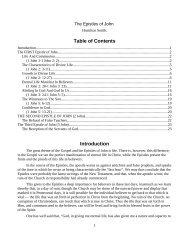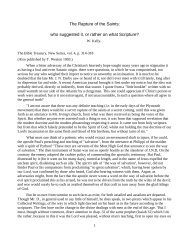An Exposition of Revelation .pdf
An Exposition of Revelation .pdf
An Exposition of Revelation .pdf
Create successful ePaper yourself
Turn your PDF publications into a flip-book with our unique Google optimized e-Paper software.
day. "I became in Spirit on the Lord's day." It is not "the day <strong>of</strong> the Lord," as has been strangely<br />
fancied, but expressed by a wholly different phrase, which guards from any such thought ( ἐν τῃ<br />
κυριακ ῃ ἡμέρᾳ). It is the characteristic day <strong>of</strong> the Christian, the birthday <strong>of</strong> his distinctive blessing, as<br />
it assuredly ought to be an especial joy <strong>of</strong> his heart, because it is the resurrection day <strong>of</strong> grace and new<br />
creation, not the seventh day <strong>of</strong> old creation rest and law. In the day <strong>of</strong> the Lord no churches are<br />
recognised on earth, nor is the Lord in any such relation as here appears. It opens in <strong>Revelation</strong> 19: 11.<br />
The Greek phrase in the two cases wholly differs. "The Lord's day," like "the Lord's Supper," is<br />
unique; "the day <strong>of</strong> the Lord" is always expressed differently, <strong>of</strong>ten as it occurs in both Old Testament<br />
and New.<br />
On that day the inspired writer John came under the power <strong>of</strong> the Holy Spirit to take in and give<br />
out the visions he was to see. "<strong>An</strong>d I heard behind me a great voice as <strong>of</strong> a trumpet." It was significant,<br />
no doubt, that the voice was "behind" him. The main object <strong>of</strong> all prophecy tended rather to have<br />
thrown him forward. But before the Spirit <strong>of</strong> God could fitly launch into the visions <strong>of</strong> the future,<br />
there must be a retrospective glance. Therefore in these preliminary chapters our Lord is seen as Son<br />
<strong>of</strong> Man judging in the midst <strong>of</strong> the seven lamps. God only discloses the distinct future when the<br />
existing object <strong>of</strong> His care is done with. In the Spirit John must be, both to shut out every impression<br />
from external objects, and to give him an entrance into all that God was about to reveal. Yet first <strong>of</strong> all<br />
we should recognise the fact that it was on the Lord's day; and next that, before he was shown what<br />
lay before, he must turn to the voice behind him and learn what the Lord judged <strong>of</strong> that which bore<br />
His name on the earth. But how new to John "a great voice as <strong>of</strong> a trumpet" from the Lord Jesus! How<br />
different from the good Shepherd's voice he and the other sheep heard and knew! A loud voice as <strong>of</strong> a<br />
trumpet summoned attention imperatively: compare Exodus 19: 19. So it will for another end in that<br />
day (Isa. 27: 13; Matt. 24: 31). In the normal state <strong>of</strong> the church it would have been incongruous.<br />
Omit the spurious opening clause, and read after it, "saying, What thou seest, write." The<br />
reference <strong>of</strong> the voice behind is exclusively to the seven assemblies. When the proper prophecy is<br />
about to begin, the first voice which he heard as <strong>of</strong> a trumpet says, "Come up hither." There is no<br />
question then <strong>of</strong> a voice behind: he goes upward, given to look into the future. But there must first be<br />
a retrospective notice, in which the Lord pronounces His judgment on that which bore the name <strong>of</strong><br />
Christendom here below. "What thou seest, write in a book, and send [it] to the seven churches; unto<br />
Ephesus, and unto Smyrna, and unto Pergamum, and unto Thyatira, and unto Sardis, and unto<br />
Philadelphia, and unto Laodicea. <strong>An</strong>d I turned to see the voice which was speaking with me. <strong>An</strong>d<br />
having turned, I saw seven golden lamps [or, lampstands]." These were responsible light-bearers, not<br />
the stands alone <strong>of</strong> course but their lamps, viewed according to God's mind about them constituted in<br />
divine righteousness. Therefore were they "golden." It is a great principle, and remarkably<br />
characterises John's writings So the standard for the Christian is not in anywise the law (it was so for<br />
the Jew); for us it is Christ Himself, and cannot without the utmost loss be anything else. "He that<br />
saith he abideth in him, ought himself also so to walk" — how? Like an Israelite? Not so; for the<br />
Christian ought to remember that he is a heavenly man (1 Cor. 15: 48), not a man <strong>of</strong> dust like Adam.<br />
He "ought himself also so to walk even as he (Christ) walked." The Christian is not under law but<br />
under grace; and this, not for salvation only, but for present walk (Rom. 6). If he have the blessing in<br />
faith, he cannot evade the responsibility in practice.<br />
Thus it is with the seven golden lamps. All must be and was measured according to God's mind,<br />
and the place in which He set the assemblies. Consistency with Him as God revealed in Christ is their<br />
rule. Hence it is they appear as "golden" damps. They had from God divine righteousness as their<br />
character; but they come under moral judgment as to their ways. How many saints there are who in<br />
10






